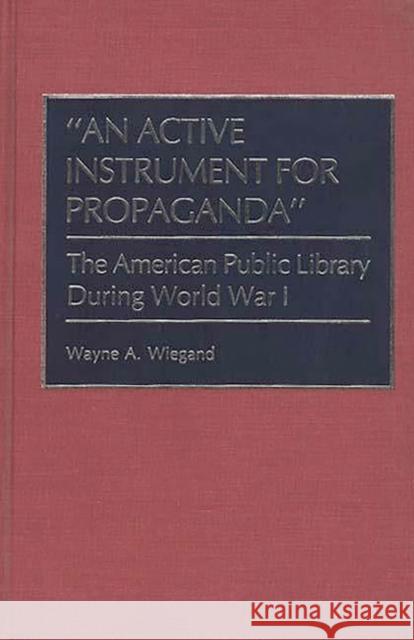An Active Instrument for Propaganda: The American Public Library During World War I » książka
An Active Instrument for Propaganda: The American Public Library During World War I
ISBN-13: 9780313267024 / Angielski / Twarda / 1989 / 205 str.
This study effectively addresses the question: What was the involvement of the American public library community in The Great War? A comprehensive introduction provides an overview of public library history prior to World War I, touching on such topics as the growth of the public library from the genteel, early nineteenth-century social libraries of New England and the Mid-Atlantic states and the founding of the American Library Association in 1876. The A.L.A. provided for an exchange of information and a means to address common problems encountered in librarianship. It facilitated the adoption of the Dewey classification system, pressed for the publication of periodical indexes, and began publishing its own collection guides. Wiegand details the socioeconomic characteristics of turn-of-the-century library professionals and their determination to address industrialization, urbanization, and immigration as these issues came within their sphere of influence. He identifies two perplexing problems of the period: the inability of public librarians to force Americans to actually use their libraries, and the challenges posed by new forces in the cultural, intellectual, and literary worlds. It is against this background that American public librarians and their institutions responded to the call for united action during World War I.Chapter 1 deals with the response to the Great European War before the United States entered on the allied side in 1917, while Chapters 2 and 3 analyze library-initiated wartime activities on both the local and national levels. The role of the public library in food conservation and the infrequently addressed issue of censorship and book burning are scrutinized in Chapters 4 and 5. Chapter 6 outlines programs for the Americanization of immigrants. A concluding chapter offers a synthesis of the volume. An essay on primary sources is included in the bibliography. An Active Instrument for Propaganda inaugurates the Beta Phi Mu's Monograph Series that, in the tradition of the International Library Science Honor Society's Chapbooks, will add significantly to the scholarly literature of the library profession. The book will be an important addition to collections dealing with World War I, and a valuable resource for historians of that period. Because wide coverage has been given to the wartime activities of hundreds of public libraries across the nation, many local public library collections will be enriched by this important volume.











